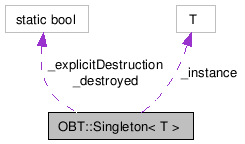
#include <OBTSingleton.h>

Static Public Member Functions | |
| static T & | getInstance () |
Private Member Functions | |
| Singleton () | |
| constructor | |
| virtual | ~Singleton () |
| destructor | |
| Singleton (const Singleton &) | |
| copy constructor | |
| Singleton & | operator= (const Singleton &) |
| assignment operator | |
Static Private Member Functions | |
| static void | create () |
| creates a new instance of T and store a pointer to it in instance_ | |
| static void | onDeadReference () |
| called on a dead reference detection, re-creates an instance and throws an exception | |
| static void | destroy () |
| flag the Singleton as destroyed | |
Static Private Attributes | |
| static T * | _instance = 0 |
| pointer to the unique instance of T in the application | |
| static bool | _destroyed = false |
| indicates if the OBTSingleton.has been destroyed | |
| static bool | _explicitDestruction = false |
| indicates if the OBTSingleton.has been destroyed once | |
Definition at line 25 of file OBTSingleton.h.
| OBT::Singleton< T >::Singleton | ( | ) | [private] |
constructor
| OBT::Singleton< T >::~Singleton | ( | ) | [inline, private, virtual] |
| OBT::Singleton< T >::Singleton | ( | const Singleton< T > & | ) | [private] |
copy constructor
| T & OBT::Singleton< T >::getInstance | ( | ) | [inline, static] |
access to the unique instance of T getInstance purposely does not catch the exception thrown when a dead reference is detected, in order to help you resolve potential design problems which lead to this situation. If you really need to access the destroyed singleton, just catch the exception thrown and call getInstance again.
Definition at line 94 of file OBTSingleton.h.
References OBT::Singleton< T >::_destroyed, OBT::Singleton< T >::_instance, OBT::Singleton< T >::create(), OBT::Singleton< T >::destroy(), and OBT::Singleton< T >::onDeadReference().
00095 { 00096 if ( _instance == NULL ) 00097 { 00098 // checks for dead reference 00099 if ( _destroyed == true ) 00100 { 00101 onDeadReference() ; 00102 } 00103 00104 // create the instance 00105 create() ; 00106 00107 // the destroy method will be called at the application exit 00108 std::atexit( destroy ) ; 00109 } 00110 return *_instance ; 00111 }
| void OBT::Singleton< T >::create | ( | ) | [inline, static, private] |
creates a new instance of T and store a pointer to it in instance_
Definition at line 118 of file OBTSingleton.h.
References OBT::Singleton< T >::_instance.
Referenced by OBT::Singleton< T >::getInstance(), and OBT::Singleton< T >::onDeadReference().
00119 { 00120 // initialise _instance 00121 static T theInstance ; 00122 _instance = &theInstance ; 00123 }
| void OBT::Singleton< T >::onDeadReference | ( | ) | [inline, static, private] |
called on a dead reference detection, re-creates an instance and throws an exception
Definition at line 130 of file OBTSingleton.h.
References OBT::Singleton< T >::_destroyed, OBT::Singleton< T >::_explicitDestruction, OBT::Singleton< T >::_instance, OBT::Singleton< T >::create(), and OBT::Singleton< T >::destroy().
Referenced by OBT::Singleton< T >::getInstance().
00131 { 00132 // obtains the shell of the destroyed singleton 00133 create() ; 00134 // now _instance points to the "ashes" of the singleton 00135 // - the raw memory that the singleton was seated in. 00136 // creates a new singleton at that address 00137 new( _instance ) T ; 00138 // reset _destroyed because we're back in business 00139 _destroyed = false ; 00140 // set _explicitDestruction because the business must be destroyed 00141 // at the application exit 00142 _explicitDestruction = true ; 00143 // the destroy method will be called at the application exit 00144 std::atexit( destroy ) ; 00145 00146 throw std::runtime_error( "Detection of a Singleton Dead Reference" ) ; 00147 }
| void OBT::Singleton< T >::destroy | ( | ) | [inline, static, private] |
flag the Singleton as destroyed
Definition at line 154 of file OBTSingleton.h.
References OBT::Singleton< T >::_destroyed, OBT::Singleton< T >::_explicitDestruction, and OBT::Singleton< T >::_instance.
Referenced by OBT::Singleton< T >::getInstance(), and OBT::Singleton< T >::onDeadReference().
00155 { 00156 if ( _explicitDestruction ) 00157 { 00158 _instance->~T() ; 00159 } 00160 _instance = NULL ; 00161 _destroyed = true ; 00162 }
| Singleton& OBT::Singleton< T >::operator= | ( | const Singleton< T > & | ) | [private] |
assignment operator
T * OBT::Singleton< T >::_instance = 0 [inline, static, private] |
pointer to the unique instance of T in the application
Definition at line 53 of file OBTSingleton.h.
Referenced by OBT::Singleton< T >::create(), OBT::Singleton< T >::destroy(), OBT::Singleton< T >::getInstance(), and OBT::Singleton< T >::onDeadReference().
bool OBT::Singleton< T >::_destroyed = false [inline, static, private] |
indicates if the OBTSingleton.has been destroyed
Definition at line 56 of file OBTSingleton.h.
Referenced by OBT::Singleton< T >::destroy(), OBT::Singleton< T >::getInstance(), and OBT::Singleton< T >::onDeadReference().
bool OBT::Singleton< T >::_explicitDestruction = false [inline, static, private] |
indicates if the OBTSingleton.has been destroyed once
Definition at line 59 of file OBTSingleton.h.
Referenced by OBT::Singleton< T >::destroy(), and OBT::Singleton< T >::onDeadReference().
 1.5.3
1.5.3